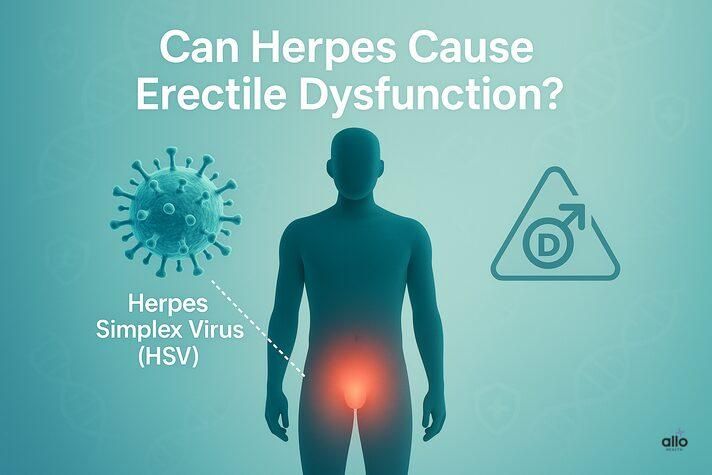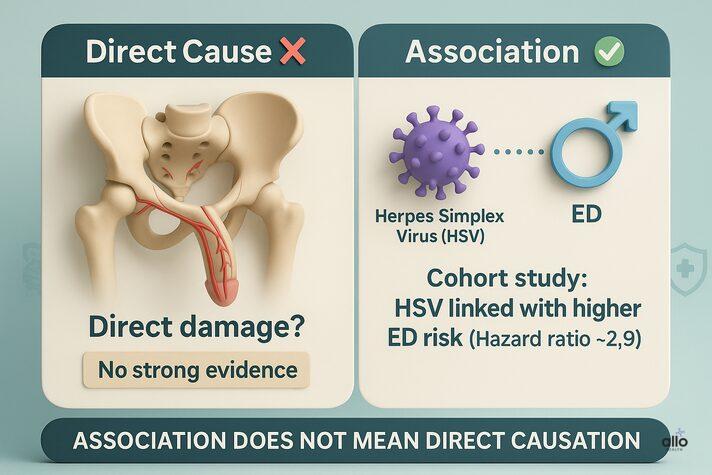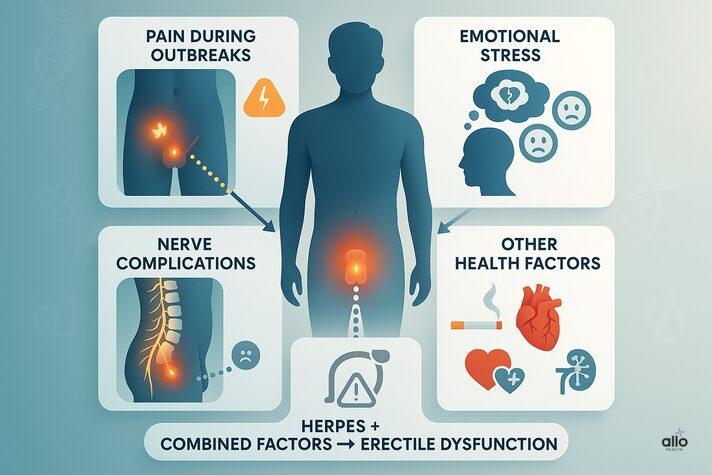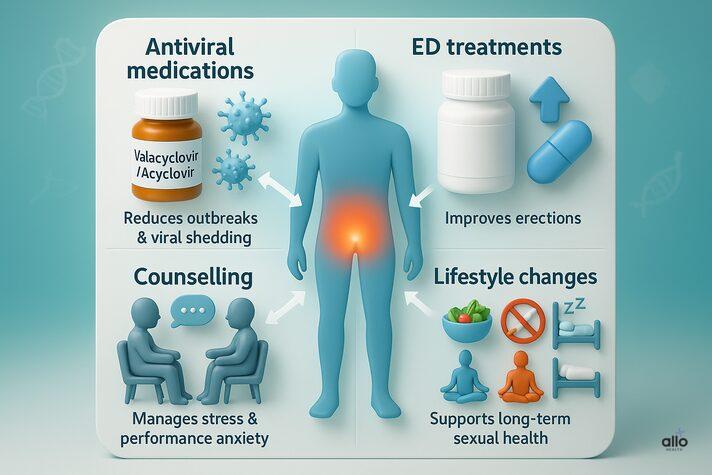Can Herpes Cause Erectile Dysfunction? What You Should Know
Written by Dr. Pranitha Bangera

Dr. Pranitha Bangera is a gold-medalist healthcare professional with an elite foundation in clinical training and patient care. A researcher at heart, she specializes in creating high-impact, research-driven medical content that empowers readers through accessible patient education. Dr. Bangera focuses on the intersection of digital health and clinical communication, specifically within the fields of sexual health and mental well-being. Her work is dedicated to making complex medical innovations understandable and trustworthy for a global audience.
•
September 9, 2025
Our experts continually monitor the health and wellness space, and we update our articles when new information becomes available.

Quick Read
Genital herpes (HSV-1/HSV-2) doesn’t usually cause erectile dysfunction (ED) directly, but it can affect sexual performance and may contribute to ED indirectly from pain during outbreaks, anxiety/stigma, or rarely nerve irritation. Studies have found that men with herpes may have a higher likelihood of experiencing ED, but this does not mean herpes is the sole cause. Other factors such as vascular health, hormones, and mental well-being often play a larger role. Antiviral therapy is effective for the treatment of herpes. Daily suppressive medications like valacyclovir or acyclovir can reduce both the frequency of outbreaks and viral shedding, lowering the risk of transmission to partners.
If you Google whether herpes causes erectile dysfunction (ED), you’ll often see a quick “yes.” But the reality is a bit different. Herpes doesn’t cause erectile dysfunction (ED) directly. But it can indirectly lead to erection problems. This means that while not every person with herpes will develop ED, there is a strong link between herpes and an increased risk for erectile dysfunction. Some men notice erection issues around the time they’re dealing with herpes. The good news is that both herpes and ED are manageable, and most men can have a satisfying sex life with the right care. Let’s learn about herpes, its connection with ED, and how to manage it.
Allo asks
What worries you most about herpes and sexual health?
What Is Herpes?
Many people think herpes only refers to infections caused by the herpes simplex virus (HSV). But there’s also herpes zoster (shingles), which comes from a related virus in the same family.[1] Each type affects the body differently, and its links with erectile dysfunction (ED) aren’t the same. To understand how herpes may be connected with ED, let’s look at the three types first:
Type
Virus
Main Symptoms
Oral Herpes
Herpes simplex virus type 1 (HSV-1)
- Cold sores
- Blisters around the mouth/ lips
- Spreads to the genitals through oral sex (sometimes)
Genital Herpes
Herpes simplex virus type 2 (HSV-2) (sometimes HSV-1)
- Painful sores/blisters in the genital or anal area
- Burning during urination
Herpes Zoster (Shingles)
Varicella zoster virus (VZV)
- Painful rash/ blisters on one side of the body
- Burning or tingling sensation
- Nerve pain that can last even after the rash heals (postherpetic neuralgia)
Does Herpes Directly Cause Erectile Dysfunction?
While not every person with herpes will develop ED, there is a recognized link between herpes and an increased risk for erectile dysfunction. A study looked at men with herpes (HSV) and compared them to men without the infection. The results showed that men with herpes were almost three times more likely to be diagnosed with ED. In medical terms, the “hazard ratio” was about 2.9. [2] But here’s the key point: this doesn’t mean herpes directly damages the blood vessels or erectile tissue. Painful outbreaks, psychological stress, and (in rare cases) nerve irritation may explain why ED happens more often in men with herpes.

How Does Herpes Indirectly Affect Sexual Function?
While the herpes simplex virus itself doesn’t usually damage the penis or blood vessels directly, there are several ways it can indirectly interfere with erections and sexual health. Think of it like a chain reaction. The virus starts the process, but other physical and emotional factors keep it going.
1. Pain and discomfort during outbreaks
- When genital sores appear, they can cause burning, itching, or stinging sensations. Trying to have sex during this time may feel physically painful, which naturally makes it harder to get or keep an erection.
- Even the anticipation or fear of pain can cause a drop in sex drive and interrupt the normal blood flow response needed for sexual activity.
- Many men end up avoiding intimacy until sores heal, which can create a cycle of sexual anxiety.
2. Emotional stress
- A herpes diagnosis often brings psychological pressure. The worry of disclosing the diagnosis, fear of rejection, and feelings of shame can cause a lot of stress. This affects self-confidence and triggers performance anxiety.
- Stress and depression are well-known risk factors for erectile dysfunction. In some men, they play a bigger role than the physical symptoms.
- Over time, this emotional weight may reduce interest in sex or make it difficult to enjoy sexual activity fully.
3. Rare nerve complications
- In very uncommon cases, herpes can inflame the nerves in the lower spinal cord (a condition called Elsberg Syndrome). [3]
- Men might experience urinary retention, numbness in the genital area, or temporary ED. These neurological complications are rare.
- This shows how a herpes virus infection can occasionally disrupt normal sexual function.
4. Health factors
- It’s important to remember that ED is multifactorial, meaning many factors can contribute.
- Conditions like vascular disease (any condition that affects blood vessels), endothelial dysfunction (dysfunction of the cells lining blood vessels), and cardiovascular diseases are major players in erectile problems.
- This is because they directly affect blood flow to the penis. If a man has herpes and other health issues such as diabetes, smoking habits, or prostate gland problems, the combination can make ED worse.
- In other words, herpes may add another layer of challenge on top of existing risks.
“According to Allo Health’s internal clinical data, “About 2% of patients with ED experience have linked it to anxiety. These insights are based on our analysis of more than 2.5 lakh patients who have visited our clinics.”

Managing Herpes and Erectile Dysfunction
When herpes and erectile dysfunction (ED) overlap, it is important to treat both the physical and psychological symptoms. Effective treatment often involves a combination of medication, counseling, and lifestyle changes.
1. Antiviral Medications
- Drugs such as acyclovir, valacyclovir, and famciclovir are widely prescribed.
- These medications don’t “cure” herpes but help suppress the creation of more viruses in the body (viral replication). This reduces the frequency and severity of the disease, eases symptoms more quickly, and lowers the risk of passing the virus to a partner.
- Evidence: Clinical trials have shown that daily suppressive therapy with valacyclovir can reduce the transmission of HSV-2 to a sexual partner by nearly 50%.[4] Consistent use also means fewer unexpected flare-ups, which can help restore confidence in sexual activity.
2. Treatments for Erectile Dysfunction
- Medications like sildenafil (Viagra), tadalafil (Cialis), and vardenafil (Levitra) (PDE5 inhibitors) increase blood flow to the penis, making it easier to achieve and maintain an erection.
- For most men, these medications are safe to use alongside antiviral therapy. However, it’s always important to review your full medication list and health conditions with your doctor.
- If pills aren’t effective or suitable, alternatives such as vacuum erection devices, penile injections, or implants can be considered under medical guidance.
3. Sexual Health Counselling
- Managing performance anxiety: The fear of experiencing pain or passing herpes to a partner can create a cycle of stress that worsens ED. This can be overcome through psychological therapy. Speaking with a sex therapist or counselor can help break this cycle of fear. Therapy can help manage stress caused by the disease as well as the effect it has on your sex life.
- Couples therapy: Open communication with your partner can reduce anxiety, build trust, and improve intimacy. Many couples find that counseling helps them explore new ways of maintaining a satisfying sex life while managing herpes safely.
4. Lifestyle Changes
Everyday habits can significantly affect both herpes outbreaks and erectile function:
- Exercise regularly: Improves blood circulation, cardiovascular health, and mood.
- Quit smoking: Smoking damages blood vessels, making erections more difficult.
- Manage weight and diet: A balanced diet and healthy body weight support both immunity and sexual health.
- Reduce stress and prioritize sleep: Stress and fatigue are known triggers for herpes outbreaks and ED. Relaxation techniques such as meditation, yoga, or deep breathing can help.
- Limit alcohol: Excessive drinking can interfere with sexual performance.
It’s normal to feel anxious about intimacy after a herpes diagnosis, but that doesn’t mean your sex life is over. Honest conversations with your partner and medical support can go a long way.

Conclusion
Herpes itself rarely causes ED directly, but it can contribute through pain, stress, or, rarely, nerve issues. Research shows an association, but other factors like vascular health and lifestyle are usually more important. The good news is that with antivirals, ED medications, counselling, and healthy habits, most men manage both conditions successfully.
Disclaimer
The following blog article provides general information and insights on various topics. However, it is important to note that the information presented is not intended as professional advice in any specific field or area. The content of this blog is for general educational and informational purposes only. The content should not be interpreted as endorsement, recommendation, or guarantee of any product, service, or information mentioned. Readers are solely responsible for the decisions and actions they take based on the information provided in this blog. It is essential to exercise individual judgment, critical thinking, and personal responsibility when applying or implementing any information or suggestions discussed in the blog.
Most Asked Questions
Can genital herpes cause erectile dysfunction?
No, herpes itself doesn’t cause ED. Herpes may contribute indirectly, especially during outbreaks or due to anxiety.
Why do I have erection problems during a herpes outbreak?
Outbreaks can cause pain, itching, and discomfort, which makes it harder to relax and enjoy sex. This stress can interfere with normal blood flow and lead to temporary ED. Once the outbreak heals, erections usually return to normal.
Can herpes medications like valacyclovir or acyclovir cause ED?
No, antiviral medications don’t typically cause erectile dysfunction. In fact, by reducing outbreaks and viral shedding, they can improve confidence and sexual comfort, which may help with erections.
Is ED permanent if I have herpes?
In most cases, no. ED linked to herpes is usually temporary or related to psychological stress. Long-term ED is more likely connected to other factors such as heart health, diabetes, smoking, or prostate gland issues.
How can I prevent herpes from affecting my sex life?
Managing herpes with antivirals, avoiding sex during outbreaks, using condoms, and having open conversations with your partner can help reduce anxiety and improve intimacy. These steps lower the chance of ED linked to herpes
Sources
- 1.
Herpes Zoster producing temporary erectile dysfunction
- 2.
Herpes simplex virus infection and erectile dysfunction: a nationwide population-based study
- 3.
Sacral Myeloradiculitis: An Uncommon Complication of Genital Herpes Infection
- 4.
Once-Daily Valacyclovir to Reduce the Risk of Transmission of Genital Herpes


